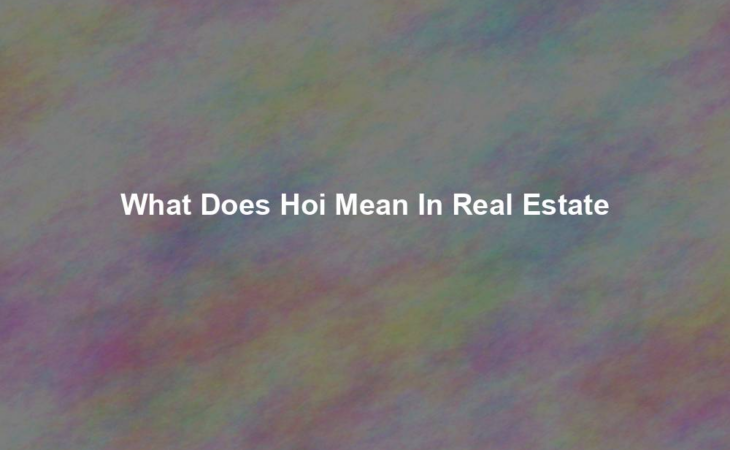
In real estate, HOI stands for Homeowners Insurance. HOI provides financial protection to homeowners in case of damages or losses to their property. It covers events like fire, theft, and natural disasters. Homeowners insurance is typically required by mortgage lenders as a condition for granting a loan. It helps homeowners safeguard their investment and provides peace of mind. It’s important to understand the coverage and terms of your HOI policy to ensure you’re adequately protected.
In the world of real estate, there are many acronyms and terms that can be confusing to buyers and sellers. One such acronym is HOI, which stands for Homeowners Insurance. While many people are familiar with the concept of insurance, understanding its role in real estate transactions is crucial to protecting one’s investment and ensuring financial security.
When delving into the world of real estate, you may come across various terminologies and acronyms. One such abbreviation that you might encounter is HOI. So, what does HOI mean in real estate? HOI stands for Homeowner’s Insurance, which is a type of insurance coverage that protects homeowners from potential financial losses due to various perils such as fire, theft, and natural disasters.
Homeowner’s Insurance is an essential aspect of real estate transactions and owning a home. It provides homeowners with peace of mind knowing that their most significant investment is protected. In this article, we will explore the significance of HOI in real estate and its implications for homeowners, buyers, and lenders.
To fully understand the meaning and importance of HOI in real estate, it’s crucial to delve deeper into its coverage, benefits, and the factors that affect its cost. Additionally, we will discuss how HOI impacts mortgage loans and why lenders require homeowners to carry this insurance.
[Link: Homeowner’s Insurance Guide]
Homeowner’s Insurance provides coverage for various perils that can cause damage or loss to your home and its contents. The specific coverage and benefits of HOI policies may vary depending on the insurance provider and policy terms. However, here are some common areas that homeowner’s insurance typically covers:
It’s important to note that every homeowner’s insurance policy has limitations, exclusions, and deductibles. It’s crucial to thoroughly review and understand your policy to ensure it meets your specific needs and adequately covers your property.
The cost of homeowner’s insurance can vary significantly depending on various factors. Insurance providers consider these factors when determining the premium for your policy:
These are just a few examples of the factors that can affect the cost of homeowner’s insurance. It’s recommended to shop around and compare quotes from different insurance companies to find the best coverage and premium for your situation.
When buying a home with a mortgage loan, lenders generally require borrowers to obtain homeowner’s insurance as a condition of the loan. This requirement protects both the lender and the homeowner. Lenders want to ensure that their investment is protected in case of damage or loss to the property.
In most cases, the lender will require the borrower to provide proof of homeowner’s insurance before finalizing the loan. The insurance coverage must meet certain minimum requirements set by the lender, such as adequate dwelling protection and liability coverage. Failure to maintain homeowner’s insurance can result in additional fees or even foreclosure.
For borrowers, having homeowner’s insurance provides financial security in case of unexpected events that could damage or destroy their homes. In the event of a covered peril, the insurance coverage helps ensure that the homeowner can afford to repair or rebuild their property without suffering significant financial loss.
[Link: Importance of Homeowner’s Insurance]
Homeowner’s Insurance (HOI) plays a crucial role in real estate. It provides protection and financial security for homeowners, buyers, and lenders. Understanding the coverage and benefits of homeowner’s insurance is essential for making informed decisions and ensuring your property is adequately protected. Factors such as property location, value, and deductible can affect the cost of homeowner’s insurance, so it’s important to evaluate different options and select the most suitable policy for your needs. When obtaining a mortgage loan, homeowner’s insurance is typically a requirement to protect the lender’s investment. By understanding the significance of HOI in real estate, you can navigate the homebuying process with confidence and peace of mind.
In real estate, HOI stands for Homeowners Insurance, which is a type of insurance that provides financial protection to homeowners in case of damage or loss to their property.
HOI covers not only the physical structure of the home but also the contents inside, as well as liability protection in case someone gets injured on the property. It is a crucial safeguard that lenders usually require before approving a mortgage loan.